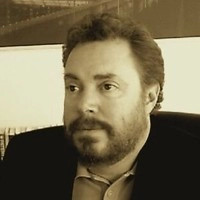
Founder and Thought Leader
Anthony, the founder and CEO of Introspective Networks (“IN”), is an industry pioneer and thought leader in cryptography, with a specialty in true ZTA compliance. IN’s Comprehensive Proactive Cybersecurity Platform (“CPCP”) proactively defends the network, customer network perimeter proactively protecting all data whether in motion or at rest against any form of network-based cyber attack in a post quantum world. SmokeNet, IN’s flagship product line, includes stealth Moving Target Defence (MTD) and uncrackable Streaming Pad Encryption (SPE) technologies. These are included in IN’s multi-patented STOP technology. STOP is the core security protocol used by SmokeNet.
Prior to founding Introspective Networks, Anthony led technical teams for over 20 years that developed systems that maintained, monitored and controlled global networks for one of the world’s largest telecommunications companies – Level 3 Communications; now known as Lumen. His teams focused on next generation solutions for private network sales, with annual revenue from their product sales in the billions of dollars.
The 2013 Snowden NSA leaks were Anthony’s call to action. Anthony realized that in addition to classified documents, the leaks exposed the US government’s Cyber Offense methods for defeating encryption and addressing cyberattacks. That is, the exposed secrets provided hackers with documented weaknesses and blueprints on how to attack existing global telecommunication and cybersecurity infrastructure. In short, it is these leaks that have led to the cybersecurity and ransomware problems currently threatening all computer networks globally.
Recognizing the severe impact of the Snowden leaks, including exposure of weaknesses in the then current US Offensive approach, the US government reissued its “Improving the Nation’s Cybersecurity” Executive Order mandate whose primary objective is to move this country to cyber defense in 2021. IN’s technology platform is designed explicitly for such cyber defense.
Today, Anthony is a nationally recognized expert and public speaker on cybersecurity. For example, he recently spoke at UCCS’ (University of Colorado/Colorado Springs) National Cybersecurity Defense Center campus.
He is also an active member and contributor of two Accredited Standards X9 Committees – the Global Standards Committee for Banking, and the Quantum Computing Risk Study Group as well as the AI Study Group, and he is actively engaged with the National Cybersecurity Center of Excellence (“NCCOE”). The NCCOE defines the set of guiding, standardized technical principles to mitigate cyber risk for Telehealth and Smart Homes technologies.
Family Business
Anthony is the son of Dr. Larry F. Thompson, a Bell Labs Fellow who headed Bell’s polymer engineering department for two decades (storied career, 1970 – 1988) developing the seminal, working polymer resist material and processes for manufacturing modern computer chips.
Dr. Thompson taught Anthony that math algorithms can not be used for encryption from his father as part of his father’s participation in the US Department of Defense’s Science Advisory Board. Encryption was a huge discussion topic, even then.
Early Days
Anthony has been breaking professional-grade, math-based game encryption since the late 1970’s to make backing up computer games on encrypted media to make copies. As Anthony learned, he was able to crack the security because ciphers that use math algorithms as the basis of the encryption have a proof and the proof will crack the encryption. (That is the second largest exposure of standard encryption today.) He was introduced to home computing as soon as it became available in the mid 1970’s as an unwitting beta testing for the first lines of Apple computers as well as terminals AT&T was building for the earliest days of the Internet in the 1980’s. Anthony also had access to some of the most formative minds (early Bell Labs UNIX computer scientists) in computer science who guided him on his early journey in learning about computing and networking.
Education
Anthony holds a postgraduate degree in Computer Science from the University of Colorado with a focus on Parallel and Distributed systems. Securing distributed systems and lowering latency created by encryption, cryptography was a point of focus in his studies.
